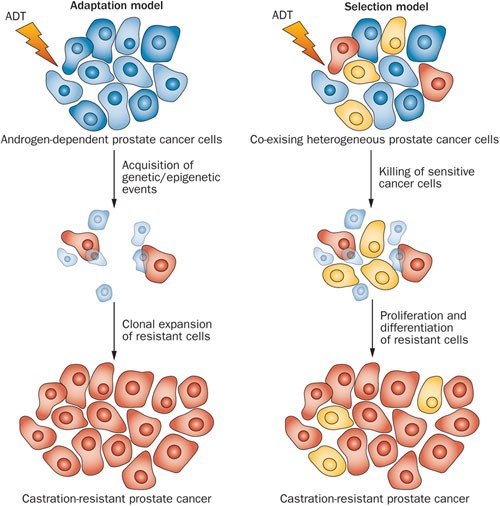Metastatic Castration-Resistant Prostate Cancer (mCRPC) is an advanced form of prostate cancer that continues to progress despite androgen deprivation therapy (ADT). In this stage, cancer spreads beyond the prostate gland to other organs, making it more difficult to treat.

Causes and Risk Factors
1. Androgen Resistance
Prostate cancer cells initially depend on androgens (male hormones) for growth. ADT reduces androgen levels, but over time, cancer cells adapt and continue to grow even in low-androgen environments.
2. Genetic Mutations
Certain genetic mutations, such as alterations in the TP53, PTEN, and BRCA1/2 genes, increase the risk of developing mCRPC.
3. Previous Cancer Treatments
Patients who have undergone radiation therapy, surgery, or hormone therapy may develop resistance to these treatments, leading to mCRPC.
4. Metastasis
mCRPC is characterized by cancer spreading beyond the prostate, often to bones, lymph nodes, lungs, and the liver.
Symptoms of mCRPC
Symptoms vary based on the organs affected, but common signs include:
- Bone pain (most common when cancer spreads to bones)
- Urinary symptoms (frequent urination, difficulty urinating)
- Fatigue and weakness
- Weight loss and loss of appetite
- Shortness of breath (if cancer spreads to the lungs)
Diagnosis
Diagnosing mCRPC involves multiple tests, including:
- Prostate-Specific Antigen (PSA) Test – Measures PSA levels to track cancer progression.
- Imaging Tests – CT scans, MRIs, and bone scans detect cancer spread.
- Biopsy and Genetic Testing – Identifies mutations that may guide targeted therapy.
Treatment Options for mCRPC
1. Androgen Receptor Targeted Therapy (ARTT)
Even after ADT fails, newer androgen receptor inhibitors such as enzalutamide and apalutamide help block residual androgen activity.
2. Chemotherapy
Docetaxel and cabazitaxel are commonly used chemotherapy drugs that can slow cancer progression and relieve symptoms.
3. Targeted Therapy
For patients with genetic mutations, targeted drugs such as Olaparib (a PARP inhibitor) provide a more personalized approach.
4. Immunotherapy
Immunotherapy drugs like Sipuleucel-T (Provenge) help boost the immune system to fight cancer cells.
5. Bone-Directed Therapy
Since mCRPC frequently spreads to bones, drugs like Zoledronic acid and Denosumab help reduce bone fractures and pain.
6. Radiopharmaceuticals
Radium-223 (Xofigo) is used to target bone metastases and relieve pain.
7. Clinical Trials and Emerging Treatments
Many patients consider enrolling in clinical trials to access new treatment options such as CAR-T cell therapy, new drug combinations, and novel hormonal therapies.
Prognosis and Life Expectancy
mCRPC prognosis depends on multiple factors, including age, overall health, treatment response, and cancer spread. While it remains an incurable condition, advances in treatment have improved survival rates. The median survival time is approximately 18–36 months with modern therapies.
Preventing Progression of Prostate Cancer
While there is no guaranteed way to prevent mCRPC, certain lifestyle changes and early interventions can help manage risk:
- Regular PSA screenings for early detection
- Healthy diet rich in fruits, vegetables, and lean proteins
- Physical activity to maintain overall health
- Managing stress through relaxation techniques and support groups
Metastatic Castration-Resistant Prostate Cancer (mCRPC) is a challenging condition, but new treatments offer hope for extended survival and improved quality of life. Patients should consult oncologists for personalized treatment strategies and consider clinical trials for emerging therapies.

